-
 Bitcoin
Bitcoin $102,881.1623
-0.60% -
 Ethereum
Ethereum $2,292.8040
-5.48% -
 Tether USDt
Tether USDt $1.0004
0.02% -
 XRP
XRP $2.0869
-2.02% -
 BNB
BNB $634.6039
-1.35% -
 Solana
Solana $136.1527
-3.00% -
 USDC
USDC $1.0000
0.01% -
 TRON
TRON $0.2728
-0.45% -
 Dogecoin
Dogecoin $0.1572
-3.70% -
 Cardano
Cardano $0.5567
-5.07% -
 Hyperliquid
Hyperliquid $34.3100
-1.20% -
 Bitcoin Cash
Bitcoin Cash $462.5691
-2.33% -
 Sui
Sui $2.5907
-5.21% -
 UNUS SED LEO
UNUS SED LEO $8.9752
1.13% -
 Chainlink
Chainlink $12.0549
-4.93% -
 Stellar
Stellar $0.2381
-2.36% -
 Avalanche
Avalanche $16.9613
-3.47% -
 Toncoin
Toncoin $2.8682
-2.36% -
 Shiba Inu
Shiba Inu $0.0...01095
-3.70% -
 Litecoin
Litecoin $81.8871
-2.43% -
 Hedera
Hedera $0.1377
-5.36% -
 Monero
Monero $310.8640
-0.68% -
 Ethena USDe
Ethena USDe $1.0007
0.03% -
 Dai
Dai $1.0001
0.03% -
 Polkadot
Polkadot $3.3103
-5.19% -
 Bitget Token
Bitget Token $4.2168
-1.95% -
 Uniswap
Uniswap $6.4643
-8.14% -
 Pepe
Pepe $0.0...09329
-7.42% -
 Pi
Pi $0.5111
-5.23% -
 Aave
Aave $235.2340
-5.77%
MetaMask cannot transfer in batches. Is the script configured correctly?
If MetaMask can't transfer tokens in batches, check your script's web3 provider config, gas allocation, and add delays to handle network congestion.
May 13, 2025 at 12:01 am
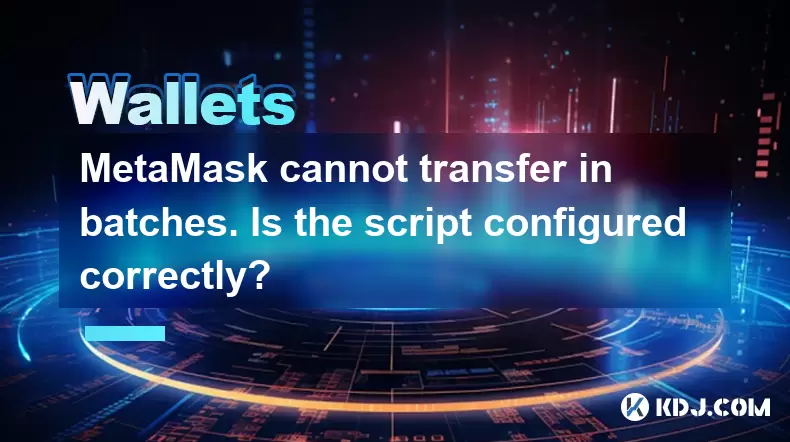
Title: MetaMask Cannot Transfer in Batches: Is the Script Configured Correctly?
When using MetaMask for cryptocurrency transactions, many users attempt to streamline their processes by using scripts to transfer tokens in batches. However, if you find that MetaMask cannot transfer in batches despite having a script, it could be due to incorrect script configuration. This article will explore common issues with batch transfer scripts for MetaMask, provide detailed troubleshooting steps, and ensure that you can successfully execute batch transfers.
Understanding MetaMask Batch Transfers
Batch transfers allow users to send multiple transactions at once, which can be particularly useful for managing large portfolios or distributing tokens to multiple addresses. MetaMask itself does not support native batch transfers, so users often rely on scripts to automate this process. The script interacts with MetaMask through the browser's web3 provider, executing multiple transactions sequentially.
Common Issues with Batch Transfer Scripts
There are several reasons why your script might not be functioning correctly for batch transfers in MetaMask. Here are some of the most common issues:
- Incorrect Web3 Provider Configuration: The script might not be correctly set up to interact with MetaMask's web3 provider.
- Insufficient Gas: Each transaction in a batch requires gas, and if the script does not account for this, transactions may fail.
- Network Congestion: High network traffic can cause delays or failures in batch transactions.
- Script Errors: Syntax errors or logical mistakes in the script can prevent it from executing correctly.
Troubleshooting Incorrect Web3 Provider Configuration
To ensure your script is correctly configured to use MetaMask's web3 provider, follow these steps:
- Check MetaMask Installation: Ensure that MetaMask is installed and properly set up in your browser.
- Verify Web3 Provider: Confirm that your script is using the correct web3 provider. MetaMask's provider can be accessed via
window.ethereum.
Here is an example of how to check and set the web3 provider in your script:
- Open your script file.
- Add the following code to check for the MetaMask provider:
if (typeof window.ethereum !== 'undefined') {console.log('MetaMask is installed!'); const web3 = new Web3(window.ethereum);} else {
console.log('Please install MetaMask!');
}
- Ensure that your script uses this
web3instance for all interactions.
Addressing Insufficient Gas Issues
Batch transfers require gas for each transaction, and if your script does not allocate enough gas, the transactions will fail. Here’s how to address this:
- Estimate Gas: Use the
web3.eth.estimateGasmethod to estimate the gas required for each transaction. - Set Gas Limit: Set a gas limit that covers the estimated gas for all transactions in the batch.
Here is an example of how to estimate and set the gas limit:
- Add the following code to your script:
async function estimateGasForBatch(transactions) {let totalGas = 0; for (let tx of transactions) { let gasEstimate = await web3.eth.estimateGas(tx); totalGas += gasEstimate; } return totalGas;}
async function sendBatchTransactions(transactions) {
let totalGas = await estimateGasForBatch(transactions); for (let tx of transactions) { tx.gas = totalGas / transactions.length; // Distribute gas evenly await web3.eth.sendTransaction(tx); }
}
- Ensure that you call
sendBatchTransactionswith your array of transactions.
Handling Network Congestion
Network congestion can cause delays or failures in batch transactions. To mitigate this:
- Monitor Network Conditions: Use tools like Etherscan to monitor network congestion before executing batch transfers.
- Adjust Transaction Timing: Implement delays between transactions to reduce the likelihood of failures due to network congestion.
Here is an example of how to add delays to your script:
- Add the following code to your script:
async function sendBatchTransactionsWithDelay(transactions, delayMs) {for (let tx of transactions) { await web3.eth.sendTransaction(tx); await new Promise(resolve => setTimeout(resolve, delayMs)); }
}
- Call
sendBatchTransactionsWithDelaywith your array of transactions and a suitable delay (e.g., 5000 milliseconds).
Identifying and Fixing Script Errors
Script errors can be tricky to identify and fix. Here are some steps to troubleshoot and resolve them:
- Use a Linter: Tools like ESLint can help identify syntax errors in your script.
- Debugging Tools: Use browser developer tools to debug your script and identify runtime errors.
- Error Handling: Implement error handling to catch and log errors during execution.
Here is an example of how to add error handling to your script:
- Add the following code to your script:
async function sendBatchTransactionsWithErrorHandling(transactions) {try { for (let tx of transactions) { await web3.eth.sendTransaction(tx); } } catch (error) { console.error('Error in batch transfer:', error); }
}
- Ensure that you call
sendBatchTransactionsWithErrorHandlingwith your array of transactions.
FAQs
Q1: Can I use MetaMask for batch transfers without a script?
A1: No, MetaMask does not natively support batch transfers. You must use a script to automate multiple transactions.
Q2: How can I test my batch transfer script without using real cryptocurrency?
A2: You can use a testnet like Rinkeby or Goerli to test your script. MetaMask supports these networks, and you can obtain testnet ETH from faucets to use in your tests.
Q3: What should I do if my batch transfer script works on a testnet but not on the mainnet?
A3: Ensure that your script accounts for differences in gas prices and network conditions between testnets and the mainnet. Adjust your gas settings and transaction timing accordingly.
Q4: Can I use a different wallet for batch transfers if MetaMask does not work?
A4: Yes, other wallets like MyEtherWallet or hardware wallets like Ledger support batch transfers through their interfaces or APIs. However, you may need to adapt your script to work with these different providers.
Disclaimer:info@kdj.com
The information provided is not trading advice. kdj.com does not assume any responsibility for any investments made based on the information provided in this article. Cryptocurrencies are highly volatile and it is highly recommended that you invest with caution after thorough research!
If you believe that the content used on this website infringes your copyright, please contact us immediately (info@kdj.com) and we will delete it promptly.
- Bitcoin Dominance, Mideast Conflict, and Altcoin Pressure: A Crypto Conundrum
- 2025-06-22 18:25:12
- Bitcoin, Stocks, and Gold: Echoes of the Past, Glimpses of the Future
- 2025-06-22 18:25:12
- Avalanche vs. Ruvi AI: Is a Six-Figure Fortune More Likely?
- 2025-06-22 18:45:12
- Stock Market News, Weekly Review: June 2025 - What You Need to Know
- 2025-06-22 18:45:12
- NFT Sales Crossroads: Polygon's Rise, Ethereum's Challenge
- 2025-06-22 19:05:12
- Meta Whale CES Token: A Web3 Launch Revolutionizing the Metaverse
- 2025-06-22 19:05:12
Related knowledge
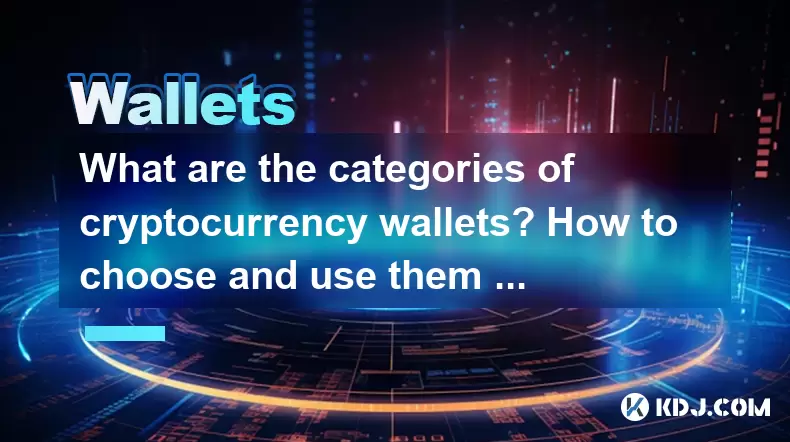
What are the categories of cryptocurrency wallets? How to choose and use them safely?
Jun 21,2025 at 10:42pm
Understanding Cryptocurrency WalletsCryptocurrency wallets are essential tools for anyone involved in the digital asset ecosystem. They allow users to store, send, and receive cryptocurrencies securely. Unlike traditional wallets that hold physical money, crypto wallets manage cryptographic keys—private and public—which interact with blockchain networks...

Which is more convenient to recover, a mnemonic wallet or a private key wallet? Will security be compromised?
Jun 20,2025 at 06:36am
Understanding Mnemonic Wallets and Private Key WalletsIn the world of cryptocurrency, wallet recovery is a crucial aspect that users must understand before storing digital assets. Two popular methods for securing and recovering wallets are mnemonic phrases and private keys. Both serve as gateways to access funds, but they differ significantly in terms o...
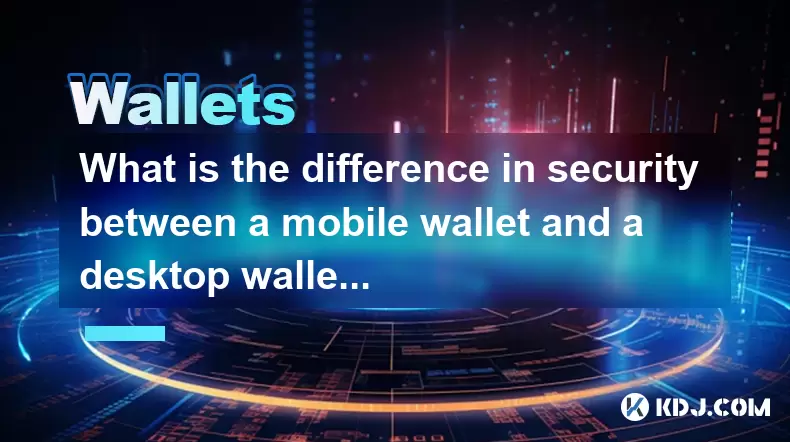
What is the difference in security between a mobile wallet and a desktop wallet?
Jun 22,2025 at 12:35pm
Understanding the Security Aspects of Mobile WalletsMobile wallets are digital wallets designed to run on smartphones, allowing users to store, send, and receive cryptocurrencies conveniently. The security of mobile wallets largely depends on how well the device is protected from malware, phishing attacks, and unauthorized access. One key feature of mob...
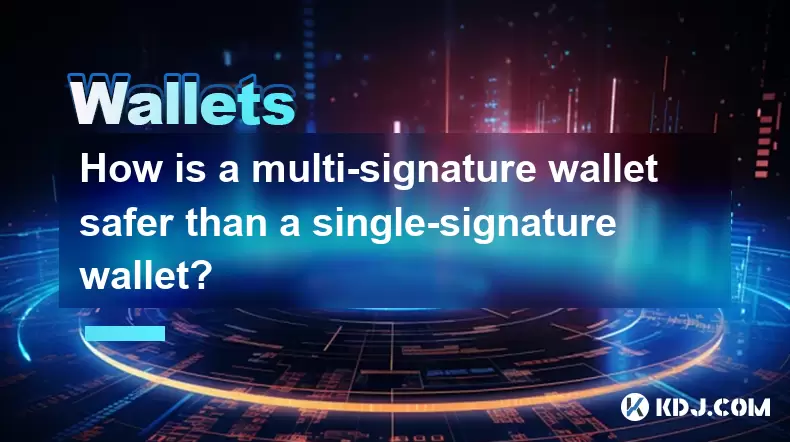
How is a multi-signature wallet safer than a single-signature wallet?
Jun 21,2025 at 07:56pm
Understanding Signature Mechanisms in Cryptocurrency WalletsIn the world of cryptocurrency, securing digital assets is paramount. One of the core aspects of this security lies in the signature mechanism used by wallets. A single-signature wallet requires only one private key to authorize a transaction. This means that if an attacker gains access to that...
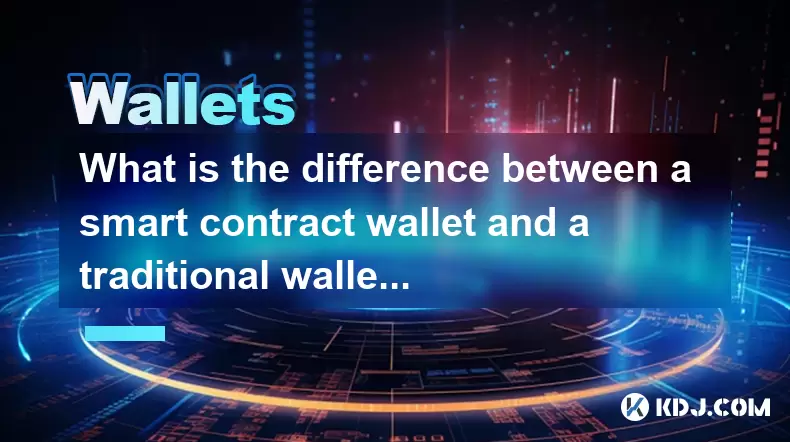
What is the difference between a smart contract wallet and a traditional wallet? In which scenarios must it be used?
Jun 21,2025 at 10:28am
Understanding Smart Contract Wallets and Traditional WalletsIn the cryptocurrency ecosystem, wallets are essential tools for managing digital assets. However, not all wallets operate in the same way. Two primary types of crypto wallets exist: smart contract wallets and traditional wallets. Each has distinct characteristics that make them suitable for sp...

How do observation wallets and signature wallets work together? What application scenarios are suitable?
Jun 20,2025 at 03:56pm
Understanding Observation Wallets and Signature WalletsIn the world of cryptocurrency, managing digital assets securely is crucial. Two types of wallets — observation wallets and signature wallets — play distinct roles in this process. An observation wallet allows users to monitor blockchain activity without holding private keys, meaning it cannot initi...

What are the categories of cryptocurrency wallets? How to choose and use them safely?
Jun 21,2025 at 10:42pm
Understanding Cryptocurrency WalletsCryptocurrency wallets are essential tools for anyone involved in the digital asset ecosystem. They allow users to store, send, and receive cryptocurrencies securely. Unlike traditional wallets that hold physical money, crypto wallets manage cryptographic keys—private and public—which interact with blockchain networks...

Which is more convenient to recover, a mnemonic wallet or a private key wallet? Will security be compromised?
Jun 20,2025 at 06:36am
Understanding Mnemonic Wallets and Private Key WalletsIn the world of cryptocurrency, wallet recovery is a crucial aspect that users must understand before storing digital assets. Two popular methods for securing and recovering wallets are mnemonic phrases and private keys. Both serve as gateways to access funds, but they differ significantly in terms o...

What is the difference in security between a mobile wallet and a desktop wallet?
Jun 22,2025 at 12:35pm
Understanding the Security Aspects of Mobile WalletsMobile wallets are digital wallets designed to run on smartphones, allowing users to store, send, and receive cryptocurrencies conveniently. The security of mobile wallets largely depends on how well the device is protected from malware, phishing attacks, and unauthorized access. One key feature of mob...

How is a multi-signature wallet safer than a single-signature wallet?
Jun 21,2025 at 07:56pm
Understanding Signature Mechanisms in Cryptocurrency WalletsIn the world of cryptocurrency, securing digital assets is paramount. One of the core aspects of this security lies in the signature mechanism used by wallets. A single-signature wallet requires only one private key to authorize a transaction. This means that if an attacker gains access to that...

What is the difference between a smart contract wallet and a traditional wallet? In which scenarios must it be used?
Jun 21,2025 at 10:28am
Understanding Smart Contract Wallets and Traditional WalletsIn the cryptocurrency ecosystem, wallets are essential tools for managing digital assets. However, not all wallets operate in the same way. Two primary types of crypto wallets exist: smart contract wallets and traditional wallets. Each has distinct characteristics that make them suitable for sp...

How do observation wallets and signature wallets work together? What application scenarios are suitable?
Jun 20,2025 at 03:56pm
Understanding Observation Wallets and Signature WalletsIn the world of cryptocurrency, managing digital assets securely is crucial. Two types of wallets — observation wallets and signature wallets — play distinct roles in this process. An observation wallet allows users to monitor blockchain activity without holding private keys, meaning it cannot initi...
See all articles



























































